
Judy Garland was an American actress and singer. She attained international stardom and critical acclaim: as an actress in both musical and dramatic roles; as a recording artist; and on the concert stage. Renowned for her versatility, she received a Golden Globe Award, a Special Tony Award and was one of twelve in history to receive an Academy Juvenile Award. Garland won the Grammy Award for Album of the Year for her 1961 live recording, Judy at Carnegie Hall; she was the first woman to win that award.
"Stormy Weather" is a 1933 torch song written by Harold Arlen and Ted Koehler. Ethel Waters first sang it at The Cotton Club night club in Harlem in 1933 and recorded it with the Dorsey Brothers' Orchestra under Brunswick Records that year, and in the same year it was sung in London by Elisabeth Welch and recorded by Frances Langford. Also in 1933, for the first time the entire floor revue from Harlem's Cotton Club went on tour, playing theatres in principal cities. The revue was originally called The Cotton Club Parade of 1933 but for the road tour it was changed to Stormy Weather Revue; it contained the song "Stormy Weather", which was sung by Adelaide Hall.
The 4th Annual Grammy Awards were held on May 29, 1962, at Chicago, Los Angeles and New York. They recognized accomplishments by musicians from the year 1961. Henry Mancini won 5 awards.
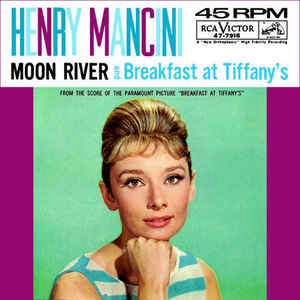
"Moon River" is a song composed by Henry Mancini with lyrics by Johnny Mercer. It was originally performed by Audrey Hepburn in the 1961 film Breakfast at Tiffany's, winning an Academy Award for Best Original Song. The song also won the 1962 Grammy Awards for Record of the Year and Song of the Year. In 1999, Mancini's recording was inducted into the Grammy Hall of Fame.
Gordon Hill Jenkins was an American arranger, composer, and pianist who was influential in popular music in the 1940s and 1950s. Jenkins worked with The Andrews Sisters, Johnny Cash, The Weavers, Frank Sinatra, Louis Armstrong, Judy Garland, Nat King Cole, Billie Holiday, Harry Nilsson, Peggy Lee and Ella Fitzgerald.
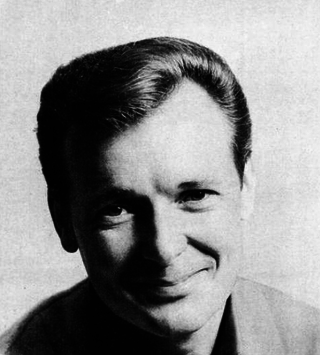
John Gary was an American singer, recording artist, television host, and performer on the musical stage.
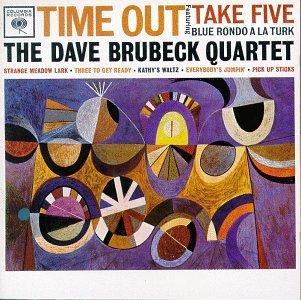
Time Out is a studio album by the American jazz group the Dave Brubeck Quartet, released in 1959 on Columbia Records. Recorded at Columbia's 30th Street Studio in New York City, it is based upon the use of time signatures that were unusual for jazz such as 9
8, 6
4 and 5
4. The album is a subtle blend of cool and West Coast jazz.

"That Old Black Magic" is a 1942 popular song written by Harold Arlen (music), with the lyrics by Johnny Mercer. They wrote it for the 1942 film Star Spangled Rhythm, when it was first sung by Johnny Johnston and danced by Vera Zorina. The song was nominated for the Academy Award for Best Original Song in 1943 but lost out to "You'll Never Know".

Physical is the eleventh studio album by British-Australian singer Olivia Newton-John, released through MCA Records on 13 October 1981. The album was produced and partly written by her long-time record producer John Farrar. Recorded and mixed at Ocean Way and David J. Holman's studio in Los Angeles, Physical became one of Newton-John's most controversial and sexual records, and her most successful studio album. Musically, the album features considerable use of synthesizers, and it explores lyrical themes such as love and relationships, sex, and environmental protection. Upon its release, the album received positive reviews from music critics, many of them considering it to be Newton-John's best effort. The album charted high in several countries, including the United States, Japan and Newton-John's native Australia, becoming one of the most successful albums of the early 1980s. It also ranks among the best-selling albums by Australian solo artists, selling more than ten million copies worldwide.

Diane Joan Schuur, nicknamed "Deedles", is an American jazz singer and pianist. As of 2015, Schuur had released 23 albums, and had extended her jazz repertoire to include essences of Latin, gospel, pop and country music. Her most successful album is Diane Schuur & the Count Basie Orchestra, which remained number one on the Billboard Jazz Charts for 33 weeks. She won Grammy Awards for best female jazz vocal performance in both 1986 and 1987 and has had three other Grammy nominations.

"Wake Up Little Susie" is a popular song written by Felice and Boudleaux Bryant and published in 1957.

"Chicago" is a popular song written by Fred Fisher and published in 1922. The original sheet music variously spelled the title "Todd'ling" or "Toddling." The song has been recorded by many artists, but the best-known versions are by Frank Sinatra, Ben Selvin and Judy Garland. The song alludes to the city's colorful past, feigning "... the surprise of my life / I saw a man dancing with his own wife", mentioning evangelist Billy Sunday as having not been able to "shut down" the city, and State Street where "they do things they don't do on Broadway".

No Strings is a musical drama with book by Samuel A. Taylor and words and music by Richard Rodgers. No Strings is the only Broadway score for which Rodgers wrote both lyrics and music, and the first musical he composed after the death of his long-time collaborator, Oscar Hammerstein II. The musical opened on Broadway in 1962 and ran for 580 performances. It received six Tony Award nominations, winning three, for Best Leading Actress in a Musical, Best Original Score and Best Choreography.
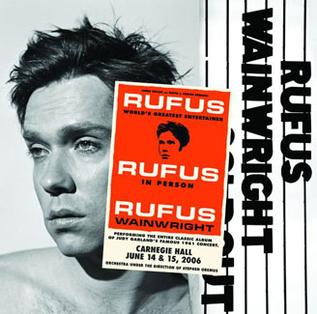
Rufus Does Judy at Carnegie Hall is the sixth album by the Canadian-American singer-songwriter Rufus Wainwright, released through Geffen Records in December 2007. The album consists of live recordings from his sold-out June 14–15, 2006, tribute concerts at Carnegie Hall to the American actress and singer Judy Garland. Backed by a 36-piece orchestra conducted by Stephen Oremus, Wainwright recreated Garland's April 23, 1961, concert, often considered "the greatest night in show business history". Garland's 1961 double album, Judy at Carnegie Hall, a comeback performance with more than 25 American pop and jazz standards, was highly successful, initially spending 95 weeks on the Billboard charts and garnering five Grammy Awards.

Judy Garland signed her first recording contract at age 13 with Decca Records in late 1935. Garland began recording albums for Capitol Records in the 1950s. Her greatest success, Judy at Carnegie Hall (1961), was listed for 73 weeks on the Billboard 200 chart, was certified Gold, and took home five Grammy Awards.

Full Circle: Carnegie Hall 2000 is a live album by Indian musician and composer Ravi Shankar, released in 2001 through the record label Angel Records. Recorded at Carnegie Hall in October 2000 as part of a tour with Shankar's daughter Anoushka, the album contains five tracks and presents two ragas. The concert occurred sixty-two years after Shankar's first performance at Carnegie Hall and commemorated his eightieth birthday; the album was his first live recording in nearly twenty years. Full Circle was produced by Hans Wendl, mastered by Scott Hull, and mixed and engineered by Tom Lazarus. Featured are performances by Tanmoy Bose and Bickram Ghosh on tabla, and Anoushka and Ravi on sitar.

"Live" at the London Palladium is a live album by American singers and actresses Judy Garland and Liza Minnelli, released in 1965 by Capitol Records.

At Carnegie Hall is the fifth live album by American singer and actress Liza Minnelli. Released in 1987, it marks the singer's first work released under the independent label Telarc Distribution.
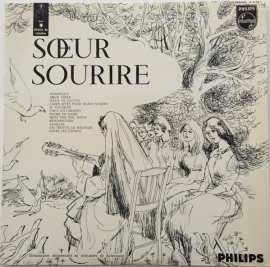
The Singing Nun is the debut studio album by Belgian musician and nun The Singing Nun, released by Philips Records in 1963. A surprise hit, the album topped the Billboard 200 and other charts internationally for several weeks and sold millions of copies, particularly on the strength of the single "Dominique". The album was initially intended to be a give-away, recorded for local children who enjoyed music from the local nunnery, but Philips decided to try giving it a widespread release, resulting in a huge commercial and critical success, garnering sales certifications and award nominations.
















